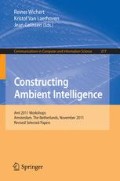Abstract
This thesis presents an approach for the automated usability evaluation of model-based adaptive user interfaces. The described approach is supposed to be used complementary to custom evaluations at development time. By combining a user model with user interface models from a model-based development framework, providing different adaptation alternatives, interaction can be simulated and evaluated accordingly. This way, no additional descriptions of the application need to be created for the evaluation. As a result the complexity and costs for applying an automated usability evaluation can be reduced significantly.
Access this chapter
Tax calculation will be finalised at checkout
Purchases are for personal use only
Preview
Unable to display preview. Download preview PDF.
References
Aarts, E., Encarnao, J.: True Visions: The Emergence of Ambient Intelligence. Springer Publishing Company, Incorporated (2008)
Anderson, J.R., Bothell, D., Byrne, M.D., Douglass, S., Lebiere, C., Qin, Y.: An integrated theory of the mind. Psychological Review 111(4), 1036–1060 (2004), http://dx.doi.org/10.1037/0033-295X.111.4.1036
Balme, L., Demeure, A., Barralon, N., Calvary, G.: CAMELEON-RT: A Software Architecture Reference Model for Distributed, Migratable, and Plastic User Interfaces. In: Markopoulos, P., Eggen, B., Aarts, E., Crowley, J.L. (eds.) EUSAI 2004. LNCS, vol. 3295, pp. 291–302. Springer, Heidelberg (2004)
Biswas, P., Robinson, P.: Automatic evaluation of assistive interfaces. In: Proceedings of the 13th International Conference on Intelligent user Interfaces, IUI 2008, pp. 247–256. ACM, New York (2008), http://doi.acm.org/10.1145/1378773.1378806
Blumendorf, M., Albayrak, S.: Towards a Framework for the Development of Adaptive Multimodal User Interfaces for Ambient Assisted Living Environments. In: Stephanidis, C. (ed.) UAHCI 2009. LNCS, vol. 5615, pp. 150–159. Springer, Heidelberg (2009)
Engelbrecht, K.P., Quade, M., Möller, S.: Analysis of a new simulation approach to dialog system evaluation. Speech Commun. 51(12), 1234–1252 (2009)
Harris, B.N., John, B.E., Brezin, J.: Human performance modeling for all: importing ui prototypes into cogtool. In: Proceedings of the 28th of the International Conference Extended Abstracts on Human Factors in Computing Systems, CHI EA 2010, pp. 3481–3486. ACM, New York (2010)
Ivory, M.Y., Hearst, M.A.: The state of the art in automating usability evaluation of user interfaces. ACM Comput. Surv. 33(4), 470–516 (2001)
John, B.E., Jastrzembski, T.: Exploration of costs and benefits of predictive human performance modeling for design. In: Proceedings of International Conference on Cognitive Modeling 2010 (2010)
John, B.E., Prevas, K., Salvucci, D.D., Koedinger, K.: Predictive human performance modeling made easy. In: CHI 2004: Proceedings of the SIGCHI Conference on Human Factors in Computing Systems, pp. 455–462. ACM Press, New York (2004)
Kieras, David: Guide to GOMS model usability evaluation using NGOMSL. In: Helander, P., Prabhu, M. (eds.) Handbook of Human-Computer Interaction, Elsevier Science B.V. (1997)
Myers, B., Hudson, S.E., Pausch, R.: Past, present, and future of user interface software tools. ACM Trans. Comput.-Hum. Interact. 7(1), 3–28 (2000)
Nazari Shirehjini, A.A.: A Multidimensional Classification Model for the Interaction in Reactive Media Rooms. In: Jacko, J. (ed.) HCI 2007, Part III. LNCS, vol. 4552, pp. 431–439. Springer, Heidelberg (2007)
Newell, A.: Unified theories of cognition. Harvard University Press, Cambridge (1990)
Paternò, F.: Model-based tools for pervasive usability. Interacting with Computers 17(3), 291–315 (2005), http://dx.doi.org/10.1016/j.intcom.2004.06.017
Sears, A.: Aide: a step toward metric-based interface development tools. In: UIST 1995: Proceedings of the 8th Annual ACM Symposium on User Interface and Software Technology, pp. 101–110. ACM Press, New York (1995)
Weiser, M.: The computer for the 21st century. Scientific American 265(3), 66–75 (1991)
Author information
Authors and Affiliations
Editor information
Editors and Affiliations
Rights and permissions
Copyright information
© 2012 Springer-Verlag Berlin Heidelberg
About this paper
Cite this paper
Quade, M. (2012). Model-Based Evaluation of Adaptive User Interfaces. In: Wichert, R., Van Laerhoven, K., Gelissen, J. (eds) Constructing Ambient Intelligence. AmI 2011. Communications in Computer and Information Science, vol 277. Springer, Berlin, Heidelberg. https://doi.org/10.1007/978-3-642-31479-7_54
Download citation
DOI: https://doi.org/10.1007/978-3-642-31479-7_54
Publisher Name: Springer, Berlin, Heidelberg
Print ISBN: 978-3-642-31478-0
Online ISBN: 978-3-642-31479-7
eBook Packages: Computer ScienceComputer Science (R0)

